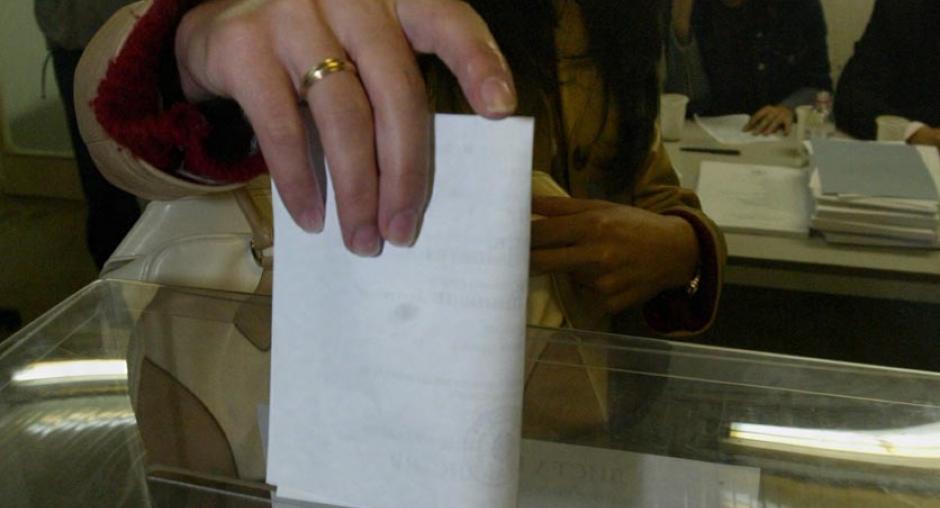Newsroom
International observers welcome Serbia's progress towards electing president
BELGRADE 14 June 2004

Voting during a previous round of presidential elections in Serbia, held on 13 October 2002.
(Milan Obradovic) Photo details
BELGRADE, 14 June 2004 - In a preliminary statement issued today, observers from the OSCE's Office for Democratic Institutions and Human Rights (ODIHR) and the Congress of Local and Regional Authorities of the Council of Europe, positively assessed the conduct of the first round of yesterday's presidential election in the Republic of Serbia (Serbia and Montenegro).
They also indicated the need to consider improvements in the areas of voter registration and campaign finance.
The observation mission concluded that the electoral process was well administered and largely consistent with OSCE commitments and Council of Europe standards for democratic elections. Observers noted that state and private media provided mostly fair, unbiased coverage of the campaign.
"With 15 candidates running for president, voters were presented with a genuine choice from across the political spectrum," said Ambassador Stephen Nash, Head of the ODIHR election observation mission. "It is also significant that inflammatory rhetoric was absent from the campaign."
Preliminary results indicate that no candidate garnered enough support to win the election outright; therefore, a second round is expected on 27 June. Observers welcomed recent changes to the republic's electoral legislation that eliminated the requirement for 50 per cent voter turnout for an election to be valid. The OSCE and Council of Europe had called for such amendments, following previous presidential elections that left Serbia without an elected president for almost two years.
"We are pleased that the Serbian Government made the necessary amendments to overcome this serious anomaly. These changes ensure the election of a president," said Mrs. Bahar Cebi, Head of the Congress delegation. "Breaking the cycle of failed elections is an important step towards strengthening Serbia's democratic institutions."
The observation mission indicated that the new law on campaign finance is only a first step towards improving transparency and accountability in this aspect of the electoral process. "Unfortunately, the law lacks clarity. It needs to define clearly where responsibility lies for financial control, and it has to ensure that candidates know how much funding they will receive and when they will receive it," said Ambassador Nash.
Commenting on the election day observations, Mrs. Cebi said: "Polling proceeded in a calm and orderly manner, and no significant irregularities were reported."
The mission included 18 experts deployed by the ODIHR in Belgrade and five regional centres, including Kosovo, since 18 May. The Congress delegation included eight observers who monitored the voting and tabulation of results on election day.
The ODIHR and the Congress are ready to assist the Serbian authorities and civil society address any shortcomings in the electoral process.
They also indicated the need to consider improvements in the areas of voter registration and campaign finance.
The observation mission concluded that the electoral process was well administered and largely consistent with OSCE commitments and Council of Europe standards for democratic elections. Observers noted that state and private media provided mostly fair, unbiased coverage of the campaign.
"With 15 candidates running for president, voters were presented with a genuine choice from across the political spectrum," said Ambassador Stephen Nash, Head of the ODIHR election observation mission. "It is also significant that inflammatory rhetoric was absent from the campaign."
Preliminary results indicate that no candidate garnered enough support to win the election outright; therefore, a second round is expected on 27 June. Observers welcomed recent changes to the republic's electoral legislation that eliminated the requirement for 50 per cent voter turnout for an election to be valid. The OSCE and Council of Europe had called for such amendments, following previous presidential elections that left Serbia without an elected president for almost two years.
"We are pleased that the Serbian Government made the necessary amendments to overcome this serious anomaly. These changes ensure the election of a president," said Mrs. Bahar Cebi, Head of the Congress delegation. "Breaking the cycle of failed elections is an important step towards strengthening Serbia's democratic institutions."
The observation mission indicated that the new law on campaign finance is only a first step towards improving transparency and accountability in this aspect of the electoral process. "Unfortunately, the law lacks clarity. It needs to define clearly where responsibility lies for financial control, and it has to ensure that candidates know how much funding they will receive and when they will receive it," said Ambassador Nash.
Commenting on the election day observations, Mrs. Cebi said: "Polling proceeded in a calm and orderly manner, and no significant irregularities were reported."
The mission included 18 experts deployed by the ODIHR in Belgrade and five regional centres, including Kosovo, since 18 May. The Congress delegation included eight observers who monitored the voting and tabulation of results on election day.
The ODIHR and the Congress are ready to assist the Serbian authorities and civil society address any shortcomings in the electoral process.
